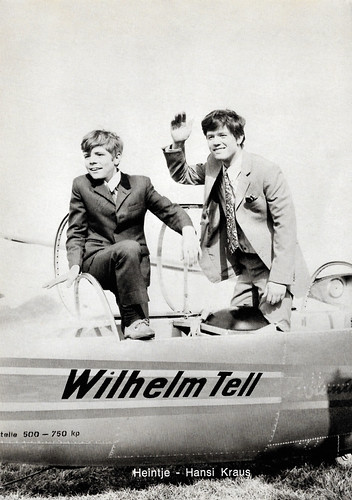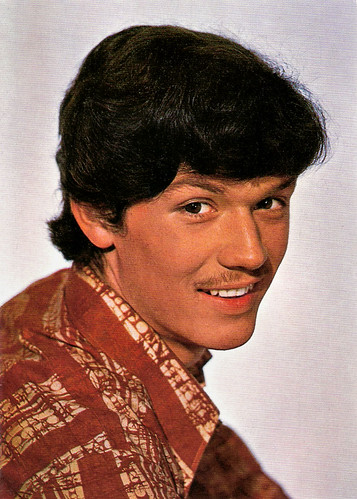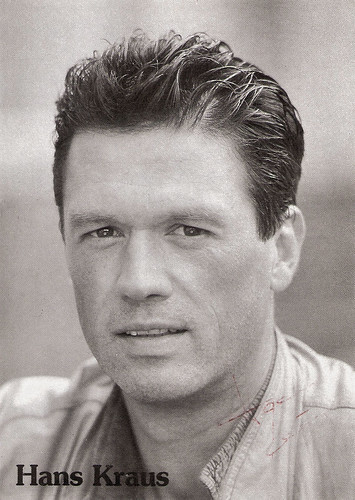Polish-born actor Hansi Kraus (1952) or Hans Kraus was as a boy a popular star of the German cinema of the 1960s.

German postcard by Franz Josef Rüdel, Filmpostkartenverlag, Hamburg, no. 5132. Photo: Constantin / Seitz / Klaus. Heintje and Hansi Kraus in Hurra, die Schule brennt - Die Lümmel von der ersten Bank IV. Teil/Hurrah, the School Is Burning (Werner Jacobs, 1969).

German postcard. Photo: Constantin / Lisa / Vogelmann. Hansi Kraus in Kinderarzt Dr. Fröhlich/Pediatrician Dr. Fröhlich (Kurt Nachmann, 1971).
Hansi Kraus was born as Hans Krause in 1952 in Gliwice, Poland. He made his film debut as a child in the Romanian film Strainul/The Stranger (Mihai Iacob, 1964), with Stefan Iordache and Irina Petrescu. The film was acclaimed at the Karlovy Vary International Film Festival in 1964.
Kraus became known for the German comedy Lausbubengeschichten/Tales of a Young Scamp (Helmut Käutner, 1964). Hans Krause sounded too Prussian to play a Bavarian character, so producer Frans Seitz decided to use the screen name 'Hansi Kraus'.
The film was based on the satiric short stories by Bavarian author Ludwig Thoma (1867-1921). He based his 'Lausbubengeschichten' (literally 'Little Scoundrel's Tales') on his own childhood, growing up in rural Oberammergau at the time of the demise of King Ludwig II of Bavaria. Kraus played the scoundrel Ludwig for whose incessant tricks and pranks nobody is safe: be it arrogant Prussian tourists, stern teachers, the superstitious village priest or Ludwig's nagging aunt.
The urban setting and the all-star cast with Heidelinde Weis, Käthe Braun, and Georg Thomalla, struck a chord with German filmgoers and Lausbubengeschichten/Tales of a Young Scamp (Helmut Käutner, 1964) became a hit at the box-office, spawning five sequels, such as Tante Frieda - Neue Lausbubengeschichten/Aunt Frieda - New Tales of a Young Scamp (Werner Jacobs, 1965) with Elisabeth Flickenschildt, and Wenn Ludwig ins Manöver zieht/When Ludwig goes into maneuver (Werner Jacobs, 1967).
T. Atzmueller at IMDb: "Of course, by today's standards Ludwig's pranks are generally harmless fun, always targeting particularly bigoted or deserving victims. (...) Non-German/-Bavarian viewers might ask themselves what all the fuzz was about. Lausbubengeschichten is a strictly local affair and it would require some background knowledge of time and area to understand all the puns and inside jokes."

German postcard by Franz Josef Rüdel, Filmpostkartenverlag, Hamburg, no. 5213. Photo: Constantin / Lisa / Vogelmann. Hansi Kraus in Kinderarzt Dr. Fröhlich/Pediatrician Dr. Fröhlich (Kurt Nachmann, 1971).

German card. Photo: Joachim von Czarnowski.
After the reservoir of Thomas's scoundrel stories was depleted, Hansi Kraus was cast in numerous other films in the same genre. Very popular were the seven 'Lümmelfilme' ('Lümmel' is another word for youthful scoundrel), where he played Pepe Nietnagel, a student who, together with his classmates, plays pranks on his teachers and other adults. The first film was Die Lümmel von der ersten Bank - 1. Trimester: Zur Hölle mit den Paukern/The louts from the first bench - 1st trimester: To hell with the teachers (Werner Jacobs, 1968) also with Gila von Weitershausen and Theo Lingen.
J. Steed at IMDb: "On the whole, the film is no more than a series of the usual adolescent, cheap and boring jokes and the usual petty love affair. The script is just acceptable with only a hint of a story; in fact, it is no more than a series of events, wearisome held together by director Werner Jacobs who directs in his well-known "as long as it is on the celluloid" style. (...) It must be said that compared to the sequels (and other films prompted by the "Lümmel films") this episode is not made badly at all - the quality such as there is would deteriorate in the sequels". Some 25 years later, he again assumed the role of the now grown-up Pepe Nietnagel in three episodes of the Austrian TV series Ein Schloß am Wörthersee/Lakeside Hotel (1991-1992).
Being typecast as a scoundrel didn't do the young actor very well. Hansi Kraus would later admit, that the industry virtually dropped him after growing up. His later films included only the Thomas Mann adaptation Unordnung und frühes Leid/Disorder and Early Torment (Franz Seitz, 1977) with Martin Held, the dismal comedy Big Mäc (Sigi Rothemund, 1985) starring TV host Thomas Gottschalk, and another disastrous comedy Starke Zeiten/Strong Times (Sigi Rothemund a.o., 1988) with another TV personality, this time Rudi Carrell.
Kraus fared better on stage and on television in such series as Waldhaus/Forest House (1987-1988) with Loni von Friedl, Löwengrube/Lion's Den (Rainer Wolffhardt, 1990-1992), and the comedy series Zum Stanglwirt (1993-1997). He was now credited as Hans Kraus.
In the new century, he continued to act on television, including a long-time stint in Forsthaus Falkenau (1994-2010). He appeared in 125 episodes of the popular drama series, starring Christian Wolff. His most recent film is the comedy Schmucklos (Thomas Schwendemann, 2019). Hans Kraus is the father of two daughters, including actress Miriam Krause.

German autograph card by Simon Offset, München.

German autograph photo.

German autograph photo, 2019.
Sources: T. Atzmueller (IMDb), J. Steed (IMDb), Wikipedia (English and German), and IMDb.
This post was last updated on 14 January 2025.

German postcard by Franz Josef Rüdel, Filmpostkartenverlag, Hamburg, no. 5132. Photo: Constantin / Seitz / Klaus. Heintje and Hansi Kraus in Hurra, die Schule brennt - Die Lümmel von der ersten Bank IV. Teil/Hurrah, the School Is Burning (Werner Jacobs, 1969).

German postcard. Photo: Constantin / Lisa / Vogelmann. Hansi Kraus in Kinderarzt Dr. Fröhlich/Pediatrician Dr. Fröhlich (Kurt Nachmann, 1971).
The pranks of a young scamp
Hansi Kraus was born as Hans Krause in 1952 in Gliwice, Poland. He made his film debut as a child in the Romanian film Strainul/The Stranger (Mihai Iacob, 1964), with Stefan Iordache and Irina Petrescu. The film was acclaimed at the Karlovy Vary International Film Festival in 1964.
Kraus became known for the German comedy Lausbubengeschichten/Tales of a Young Scamp (Helmut Käutner, 1964). Hans Krause sounded too Prussian to play a Bavarian character, so producer Frans Seitz decided to use the screen name 'Hansi Kraus'.
The film was based on the satiric short stories by Bavarian author Ludwig Thoma (1867-1921). He based his 'Lausbubengeschichten' (literally 'Little Scoundrel's Tales') on his own childhood, growing up in rural Oberammergau at the time of the demise of King Ludwig II of Bavaria. Kraus played the scoundrel Ludwig for whose incessant tricks and pranks nobody is safe: be it arrogant Prussian tourists, stern teachers, the superstitious village priest or Ludwig's nagging aunt.
The urban setting and the all-star cast with Heidelinde Weis, Käthe Braun, and Georg Thomalla, struck a chord with German filmgoers and Lausbubengeschichten/Tales of a Young Scamp (Helmut Käutner, 1964) became a hit at the box-office, spawning five sequels, such as Tante Frieda - Neue Lausbubengeschichten/Aunt Frieda - New Tales of a Young Scamp (Werner Jacobs, 1965) with Elisabeth Flickenschildt, and Wenn Ludwig ins Manöver zieht/When Ludwig goes into maneuver (Werner Jacobs, 1967).
T. Atzmueller at IMDb: "Of course, by today's standards Ludwig's pranks are generally harmless fun, always targeting particularly bigoted or deserving victims. (...) Non-German/-Bavarian viewers might ask themselves what all the fuzz was about. Lausbubengeschichten is a strictly local affair and it would require some background knowledge of time and area to understand all the puns and inside jokes."

German postcard by Franz Josef Rüdel, Filmpostkartenverlag, Hamburg, no. 5213. Photo: Constantin / Lisa / Vogelmann. Hansi Kraus in Kinderarzt Dr. Fröhlich/Pediatrician Dr. Fröhlich (Kurt Nachmann, 1971).

German card. Photo: Joachim von Czarnowski.
A series of the usual adolescent, cheap and boring jokes
After the reservoir of Thomas's scoundrel stories was depleted, Hansi Kraus was cast in numerous other films in the same genre. Very popular were the seven 'Lümmelfilme' ('Lümmel' is another word for youthful scoundrel), where he played Pepe Nietnagel, a student who, together with his classmates, plays pranks on his teachers and other adults. The first film was Die Lümmel von der ersten Bank - 1. Trimester: Zur Hölle mit den Paukern/The louts from the first bench - 1st trimester: To hell with the teachers (Werner Jacobs, 1968) also with Gila von Weitershausen and Theo Lingen.
J. Steed at IMDb: "On the whole, the film is no more than a series of the usual adolescent, cheap and boring jokes and the usual petty love affair. The script is just acceptable with only a hint of a story; in fact, it is no more than a series of events, wearisome held together by director Werner Jacobs who directs in his well-known "as long as it is on the celluloid" style. (...) It must be said that compared to the sequels (and other films prompted by the "Lümmel films") this episode is not made badly at all - the quality such as there is would deteriorate in the sequels". Some 25 years later, he again assumed the role of the now grown-up Pepe Nietnagel in three episodes of the Austrian TV series Ein Schloß am Wörthersee/Lakeside Hotel (1991-1992).
Being typecast as a scoundrel didn't do the young actor very well. Hansi Kraus would later admit, that the industry virtually dropped him after growing up. His later films included only the Thomas Mann adaptation Unordnung und frühes Leid/Disorder and Early Torment (Franz Seitz, 1977) with Martin Held, the dismal comedy Big Mäc (Sigi Rothemund, 1985) starring TV host Thomas Gottschalk, and another disastrous comedy Starke Zeiten/Strong Times (Sigi Rothemund a.o., 1988) with another TV personality, this time Rudi Carrell.
Kraus fared better on stage and on television in such series as Waldhaus/Forest House (1987-1988) with Loni von Friedl, Löwengrube/Lion's Den (Rainer Wolffhardt, 1990-1992), and the comedy series Zum Stanglwirt (1993-1997). He was now credited as Hans Kraus.
In the new century, he continued to act on television, including a long-time stint in Forsthaus Falkenau (1994-2010). He appeared in 125 episodes of the popular drama series, starring Christian Wolff. His most recent film is the comedy Schmucklos (Thomas Schwendemann, 2019). Hans Kraus is the father of two daughters, including actress Miriam Krause.

German autograph card by Simon Offset, München.

German autograph photo.

German autograph photo, 2019.
Sources: T. Atzmueller (IMDb), J. Steed (IMDb), Wikipedia (English and German), and IMDb.
This post was last updated on 14 January 2025.
No comments:
Post a Comment